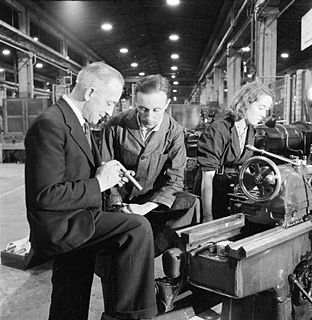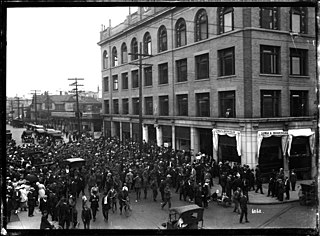Related Research Articles
Labour laws are those that mediate the relationship between workers, employing entities, trade unions and the government. Collective labour law relates to the tripartite relationship between employee, employer and union. Individual labour law concerns employees' rights at work also through the contract for work. Employment standards are social norms for the minimum socially acceptable conditions under which employees or contractors are allowed to work. Government agencies enforce labour law.
Collective bargaining is a process of negotiation between employers and a group of employees aimed at agreements to regulate working salaries, working conditions, benefits, and other aspects of workers' compensation and rights for workers. The interests of the employees are commonly presented by representatives of a trade union to which the employees belong. The collective agreements reached by these negotiations usually set out wage scales, working hours, training, health and safety, overtime, grievance mechanisms, and rights to participate in workplace or company affairs.
Employment is a relationship between two parties regulating the provision of paid labour services. Usually based on a contract, one party, the employer, which might be a corporation, a not-for-profit organization, a co-operative, or any other entity, pays the other, the employee, in return for carrying out assigned work. Employees work in return for wages, which can be paid on the basis of an hourly rate, by piecework or an annual salary, depending on the type of work an employee does, the prevailing conditions of the sector and the bargaining power between the parties. Employees in some sectors may receive gratuities, bonus payments or stock options. In some types of employment, employees may receive benefits in addition to payment. Benefits may include health insurance, housing, disability insurance. Employment is typically governed by employment laws, organisation or legal contracts.

The Australian Council of Trade Unions (ACTU), originally the Australasian Council of Trade Unions, is the largest peak body representing workers in Australia. It is a national trade union centre of 46 affiliated unions and eight trades and labour councils. The ACTU is a member of the International Trade Union Confederation.

United Kingdom labour law regulates the relations between workers, employers and trade unions. People at work in the UK can rely upon a minimum charter of employment rights, which are found in Acts of Parliament, Regulations, common law and equity. This includes the right to a minimum wage of £9.50 for over-23-year-olds from April 2022 under the National Minimum Wage Act 1998. The Working Time Regulations 1998 give the right to 28 days paid holidays, breaks from work, and attempt to limit long working hours. The Employment Rights Act 1996 gives the right to leave for child care, and the right to request flexible working patterns. The Pensions Act 2008 gives the right to be automatically enrolled in a basic occupational pension, whose funds must be protected according to the Pensions Act 1995.
Featherbedding is the practice of hiring more workers than are needed to perform a given job, or to adopt work procedures which appear pointless, complex and time-consuming merely to employ additional workers. The term "make-work" is sometimes used as a synonym for featherbedding.

Otis Worldwide Corporation is an American company that develops, manufactures and markets elevators, escalators, moving walkways, and related equipment.

Industrial action or job action is a temporary show of dissatisfaction by employees—especially a strike or slowdown or working to rule—to protest against bad working conditions or low pay and to increase bargaining power with the employer and intended to force the employer to improve them by reducing productivity in a workplace. Industrial action is usually organized by trade unions or other organised labour, most commonly when employees are forced out of work due to contract termination and without reaching an agreement with the employer. Quite often it is used and interpreted as a euphemism for strike or mass strike, but the scope is much wider. Industrial action may take place in the context of a labour dispute or may be meant to effect political or social change. This form of communication tends to be their only means to voice their concerns about safety and benefits.

The Canada Labour Code is an Act of the Parliament of Canada to consolidate certain statutes respecting labour. The objective of the Code is to facilitate production by controlling strikes & lockouts, occupational safety and health, and some employment standards.

A union representative, union steward, or shop steward is an employee of an organization or company who represents and defends the interests of their fellow employees as a labor union member and official. Rank-and-file members of the union hold this position voluntarily while maintaining their role as an employee of the firm. As a result, the union steward becomes a significant link and conduit of information between the union leadership and rank-and-file workers.
Overtime bans are a type of strike in which workers refuse to engage in overtime work, being any work that falls outside of contracted hours. They do this to leverage their employer into negotiating various working conditions. Often organised in unions, workers may choose this form of industrial action to bargain for a higher rate of pay, better working conditions or to discourage an employer from making redundancies. Unlike a full strike in which employees are usually in breach of their contract, workers engaging in overtime bans are typically well protected. Employers cannot legally withhold normal wages during an overtime ban if employees are not breaching the terms of their employment contracts by refusing to do overtime work. However, the legalities of overtime bans do vary between countries. Overtime bans are effective where "industries and organisations run on such habitually high levels of overtime or goodwill that overtime bans ... can have a significant and immediate impact upon the availability of a good or service". Historically, unions have at times received criticism on ethical grounds for choosing to enact overtime bans. The literature records the occurrence of such bans from the 1800s and there is documentation of their use in four continents.

Labor relations is a field of study that can have different meanings depending on the context in which it is used. In an international context, it is a subfield of labor history that studies the human relations with regard to work – in its broadest sense – and how this connects to questions of social inequality. It explicitly encompasses unregulated, historical, and non-Western forms of labor. Here, labor relations define "for or with whom one works and under what rules. These rules determine the type of work, type and amount of remuneration, working hours, degrees of physical and psychological strain, as well as the degree of freedom and autonomy associated with the work."
A collective agreement, collective labour agreement (CLA) or collective bargaining agreement (CBA) is a written contract negotiated through collective bargaining for employees by one or more trade unions with the management of a company that regulates the terms and conditions of employees at work. This includes regulating the wages, benefits, and duties of the employees and the duties and responsibilities of the employer or employers and often includes rules for a dispute resolution process.
A whipsaw strike is a strike by a trade union against only one or a few employers in an industry or a multi-employer association at a time. The strike is often of a short duration, and usually recurs during the labor dispute or contract negotiations—hence the name "whipsaw".
A side letter or side agreement is a collective bargaining agreement that is not part of the underlying or primary collective bargaining agreement (CBA) which the parties to the contract use to reach agreement on issues the CBA does not cover, to clarify issues in the CBA, or to modify the CBA. One may distinguish side letters from "side settlements" or "settlement agreements", which settle a dispute arising from the underlying CBA. In rare cases, bargaining parties may use a side letter to adjust the focus of the contract if the parties are not yet ready or willing to adapt the contract formally.
European labour law regulates basic transnational standards of employment and partnership at work in the European Union and countries adhering to the European Convention on Human Rights. In setting regulatory floors to competition for job-creating investment within the Union, and in promoting a degree of employee consultation in the workplace, European labour law is viewed as a pillar of the "European social model". Despite wide variation in employment protection and related welfare provision between member states, a contrast is typically drawn with conditions in the United States.
The Dunlop Commission on the Future of Worker-Management Relations: Final Report, commonly called the Dunlop Report, was a major review of US labor law, containing recommendations for reform, established by the US Department of Labor and US Department of Commerce.
South African labour law regulates the relationship between employers, employees and trade unions in the Republic of South Africa.
SA8000 is an auditable certification standard that encourages organizations to develop, maintain, and apply socially acceptable practices in the workplace. It was developed in 1989 by Social Accountability International, formerly the Council on Economic Priorities, by an advisory board consisting of trade unions, NGOs, civil society organizations and companies. The SA8000's criteria were developed from various industry and corporate codes to create a common standard for social welfare compliance.
A master contract or master agreement is a collective bargaining agreement which covers all unionized worksites in an industry, market or company, and which establishes the terms and conditions of employment common to all workers in the industry, market or company.
References
- 1 2 3 Lokhshahi Hakk Sanghatana (May 1999). This was no accident - The death of an Otis contract worker and the responsibility of the Otis management (PDF) (Report).
- ↑ "How 'Labour Reforms' Are Implemented: The Story of Otis Elevators". Aspects of India's Economy .
- ↑ Lokhshahi Hakk Sanghatana (May 2001). Otis Elevators and Safety: Damning New Evidence (PDF) (Report).